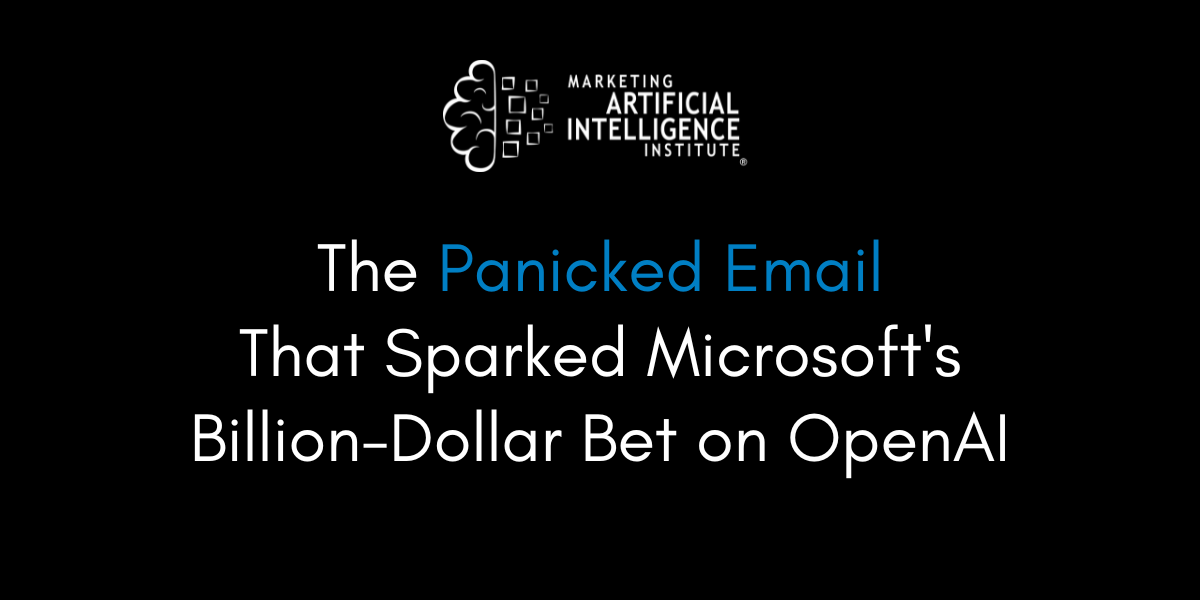A newly unsealed email has shed light on one possible reason Microsoft made its initial billion-dollar bet on OpenAI...
Sheer panic over how much progress Google had made on AI.
Parts of an email sent in 2019 by Microsoft CTO Kevin Scott to CEO Satya Nadella have now come to light as part of Google's ongoing antitrust case with the US Department of Justice.
In the email, Scott became "very, very worried" that he had underestimated Google's AI capabilities.
Despite initially dismissing Google's AI efforts as mere "game-playing stunts," Scott admitted this was "a mistake."
Nadella immediately forwarded the email to his CFO, explaining "this is why I want us to do this"—an apparent reference to investing in OpenAI.
Within weeks, Microsoft had invested $1 billion into the AI startup, the first of several huge investments.
Did Microsoft rush its investment in OpenAI?
Is Google really ahead in the AI arms race?
I got the answers from Marketing AI Institute founder and CEO Paul Roetzer in Episode 96 of The Artificial Intelligence Show.
Google's "hidden" AI lead...
The email stands in stark contrast to prevailing narratives over the last few years that have painted Google as an AI laggard.
"A belief that Google was behind in AI is a pretty uneducated opinion," says Roetzer. "They were never behind in AI research. They were behind in the productization of the AI."
At the time the email was sent, Microsoft appeared to only acknowledge Google's AI work on training models to master complex games like Go. This was a high-profile effort that saw DeepMind (acquired by Google and started by current AI head Demis Hassabis) build AI that beat a human Go champion.
In reality, they were doing much, much more like:
- Inventing the transformer architecture powering today's language models
- Assembling unrivaled infrastructure of data, chips, and talent
- And building AI-powered features like Smart Compose and Smart Reply
"So they're doing a lot. But it appears at that point that Kevin and Microsoft maybe are under appreciating all of the progress they're making," says Roetzer.
OpenAI's massive ambitions...
This is where OpenAI enters the picture, compounding Microsoft's panic.
Despite its advantages, Google failed to truly appreciate and quickly commercialize its breakthroughs in transformer architecture in 2017.
OpenAI, however, realized the potential of transformers and used them to build GPT-1.
Microsoft, at the time, was doing very specific, very narrow things using machine learning to make predictions about outcomes and behaviors, says Roetzer.
"They didn't have this grand vision for what happens when AI can think and reason and understand and generate," he says. "That's what OpenAI had."
Other companies began to apply similar technology to image and video generation, too.
"All the while, Microsoft wasn't there," says Roetzer.
Despite having "very smart machine learning people" of its own, Scott said Microsoft's AI teams were too small and constrained to close the gap.
"Even as we start to feed them resources, they still have to go through a learning process to scale up," he wrote in the emails, only a portion of which aren't redacted. "And we are multiple years behind the competition in terms of ML scale."
And Microsoft's countermove
Given the ferocious competitive landscape, Microsoft likely saw an investment in OpenAI as a way to catch up.
"That's what Kevin's saying, basically," says Roetzer. "Even if we throw a billion dollars at this, we go hire a thousand researchers, we are not set up to do this."
Instead, partnering with OpenAI offered a shortcut that could close the gap.
The result?
An initial investment of $1 billion in the company, weeks after Scott's email.
And a total of more than $13 billion invested to date.
Mike Kaput
Mike Kaput is the Chief Content Officer at SmarterX and a leading voice on the application of AI in business. He is the co-author of Marketing Artificial Intelligence and co-host of The Artificial Intelligence Show podcast.


